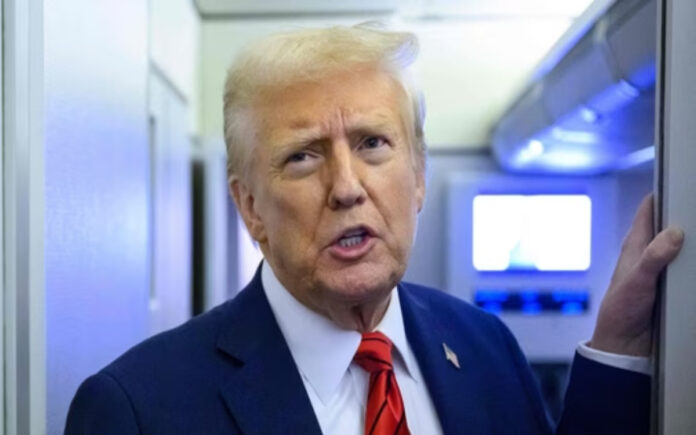Washington: U.S. President Donald Trump expressed growing frustration on Sunday over the ongoing ceasefire agreement between Israel and Hamas, following the release of three Israeli hostages over the weekend. Trump, comparing their frail condition to Holocaust survivors, suggested that U.S. patience with the deal was wearing thin.
“They look like Holocaust survivors. They were in horrible condition. They were emaciated,” Trump told reporters aboard Air Force One while en route to New Orleans for the Super Bowl. “I don’t know how much longer we can take that … at some point we’re going to lose our patience.”
His remarks introduced new uncertainty over the ceasefire arrangement before the release of the remaining 76 hostages. Trump’s statements also followed his recent call for Palestinians to be removed from Gaza and for the U.S. to assume control of the territory.
Hostage Release and Reactions

The three hostages—Ohad Ben Ami and Eli Sharabi, abducted from Kibbutz Be’eri during Hamas’ October 7, 2023, attack on southern Israel, and Or Levy, taken from the Nova music festival—were led onto a Hamas platform by gunmen before being handed over to Israeli authorities. Their gaunt and weakened appearance stood in contrast to the 18 other hostages previously released under the ceasefire deal, which was brokered on January 15.
In exchange for the three men, Israel released 183 Palestinian prisoners on Saturday. Many of the freed Palestinian detainees have also appeared thin and malnourished upon their release.
Also Read | Trump Proposes U.S. Ownership of Gaza, Suggests Regional Nations Rebuild
Israeli Prime Minister Benjamin Netanyahu described the condition of the hostages as “shocking” and vowed to address the issue.
Trump’s Gaza Proposal
Trump reiterated his stance on U.S. control over Gaza, reaffirming his commitment to taking ownership of the territory once Palestinians leave or are removed. The proposal, first announced on February 4 during Netanyahu’s visit to Washington, has sparked widespread international debate.
“As far as us rebuilding it, we may give it to other states in the Middle East to build sections of it, other people may do it, through our auspices. But we’re committed to owning it, taking it, and making sure that Hamas doesn’t move back,” he said.
Also Read | Trump Claims U.S. Debt May Be Lower Due to Treasury Fraud
Trump’s proposal to assume control of Gaza has drawn strong opposition from several nations, particularly in the Middle East, while details of how such a plan would be implemented remain unclear.



